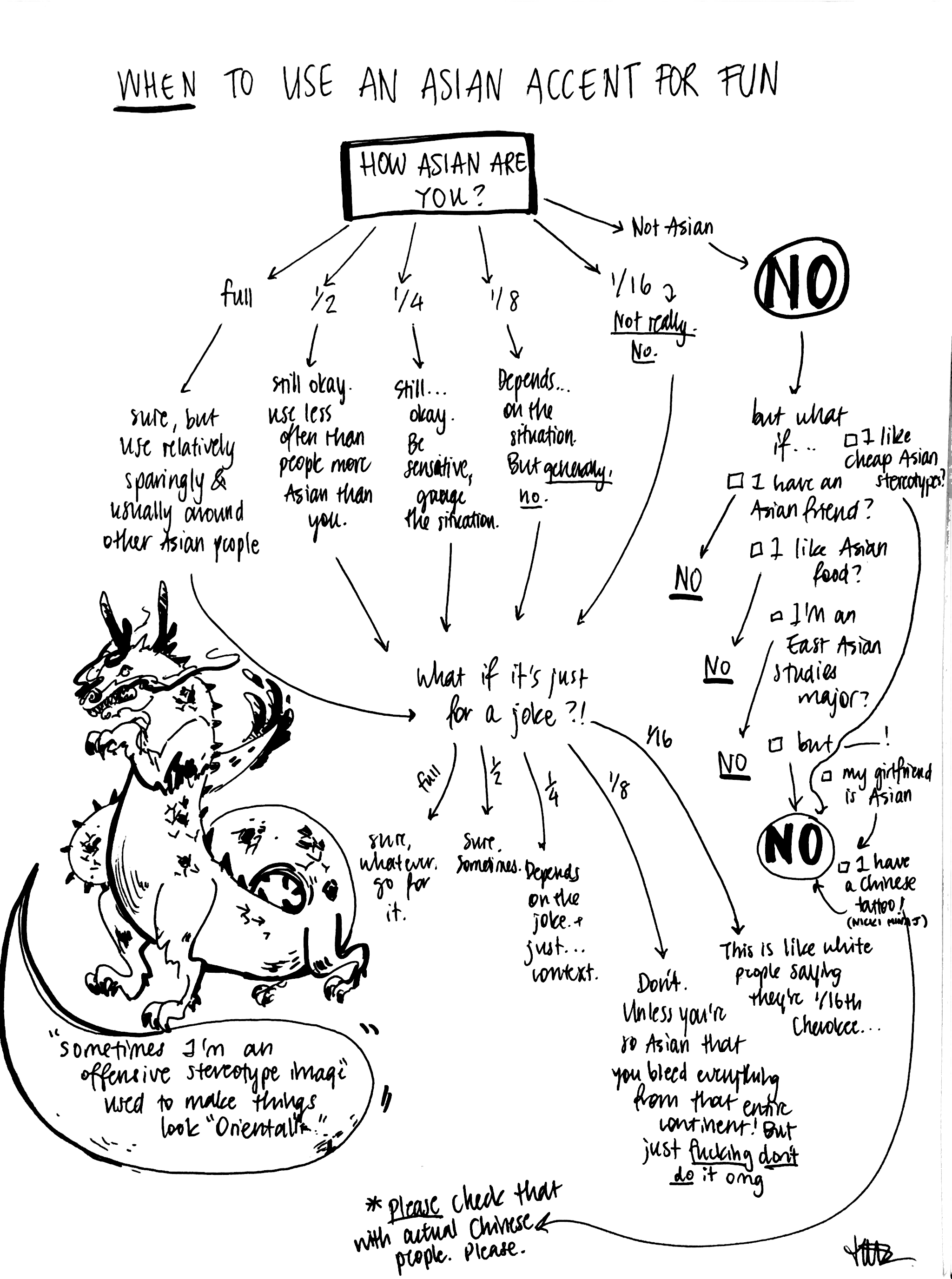I’d be willing to bet that most of you reading this now have heard, at one time or another, someone crack a joke about Asians and put on an affected Asian accent. The amount of jokes that accent can be applied to are endless. Are you making jokes about being cheap? Asian accent. About getting good grades? The accent. What about math nerd jokes? Again, the accent. It’s so applicable, isn’t it?
It can be hilarious. It’s very applicable to jokes, specifically jokes that play on racial stereotypes. But here’s something that may be surprising to some of you: you shouldn’t make racist jokes unless you’re the race in question. I’m Chinese. I can make all the jokes I want about the stereotypes about my culture. I can make cheapskate jokes about myself in the same way you can call yourself a jerk but strangers saying that to you would be rude. Who are you to tell me how well I know myself and my culture? What gives you the authority to tell me when it’s appropriate to use that accent, an accent that most Chinese people learning English struggle with and are mocked for on a day-to-day basis?
Most of you might think I’m overreacting over a very small thing. It is a small thing, but small things matter. This ties into a much bigger picture.
The kind of racism that Asian-Americans face is distinct from the kind that African-Americans confront, which is the kind of racism that immediately jumps to mind when discussing discrimination in America. Racism against black people tends to be overtly unacceptable, and most people, regardless of their race, can call it out whether they are black, white or Asian. The black community in the U.S. is admirably not hesitant about raising issues and fighting for the right to be treated fairly. On the other hand, Asians are often left out of the racial dialogue; when it comes to the Asian community, attitudes are different because the nature of the target group itself is different.
Racism against Asians is of an insidious nature, in the realm of “it was just a joke” or falling somewhere under the umbrella of “positive racism.” There’s a long history of the West reducing Eastern people to manageable stereotypes. Western colonial imperialism has left a mark on how the world sees Asians in a Western context such as America; Asians are considered a model minority here and reduced to a status that essentially equates to being seen as harmless, because Asians don’t tend to fight back the same way African-Americans can and do against institutionalized racism. There is a strong feeling within Asian culture that one should keep their head down and out of trouble in the face of things like discrimination because it lessens the chance of harm. This worked in the interests of my parents, who were immigrants back in the late eighties and early nineties. For their children like myself, we grew up in an America that gave us the ability and the nerve to talk back against problems just like this one.
The issue with racism against Asians is that it is culturally acceptable, and it is incredibly frustrating. This means that there can be smash Broadway hits like “Miss Saigon,” in which a Vietnamese prostitute falls in love with an American GI. The GI abandons her for his white American wife and the noble prostitute kills herself. Our cultural acceptance of Asian stereotypes means that there are white people wearing yellowface in classic movies, like Mickey Rooney’s role of Mr. Yunioshi in “Breakfast at Tiffany’s.” And then there was the moment when Colbert satire went a touch too far with the “Ching-Chong Ding-Dong Foundation for Sensitivity to Orientals or Whatever.”
The production of stereotypes like the quiet nerd, the math geek, the shyest student, the quiet and submissive Asian girl, the number-crunching machine—it’s all so easy to shrug off as a joke. It boxes Asian people in, and calling people out for promoting those stereotypes all too easily leads to dismissal because those stereotypes are not overtly, in-your-face offensive.
Recently, a friend of mine told me that as a child, she had pointy eyes and “looked Asian.” When I told her that was kind of offensive, she said that she was stating a fact. She later apologized—not for how what she said was mildly racist, but “if it made you uncomfortable.” She missed the fact that the issue was not that her eyes were shaped that way “as a kid” or necessarily that I took offense, but for the automatic way she associated it with Asians and then told me that to my face.
So, long story short: Try not to use fake Asian accents for fun unless you’re actually Asian. Respect the cultures, don’t be racist and do your best to not promote bad stereotypes because it’s not that hard. Try taking a look at the helpful flowchart alongside this article the next time you feel tempted to crack an accent-related joke.



